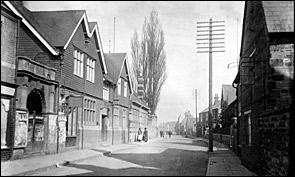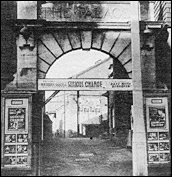|
The cinema was built in 1914 by local shoe manufacturers, Joseph Westley and Henry Whitney, plumbing engineer A.G. Miller, Fred. T. Freestone and others, who had formed a company which they named the Burton Latimer Electric Palace Company. This company had bought the Burton Latimer Coffee House building and used its bowling green and other land standing behind its High Street premises on which to build the cinema. (The company also provided a cafe, billiards and other recreational facilities in the Coffee House that also accommodated a Liberal Club between 1905-15. Eventually, in the mid 1920s, became Barclays Bank, which occupied the building until 2017.)
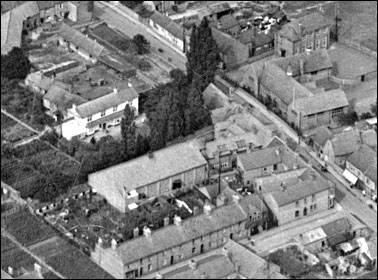 |
|
An aerial view of the cinema 1923
|
The former stone built private house between the bank and cinema is part of the old farmhouse that was on the site before either was built and its garden was used as a playground for the nearby Council school.
The cinema generated its own electricity and the building was heated by pipes from a coke boiler.
Arthur (Mac) Goodman was the first projectionist who during the daytime worked as a painter and decorator for A.G.Miller. After Goodman’s death in 1927 he was followed by “Tut” Clipston whom he had trained. (To read newspaper article "Showing Silent Flicks Was Fun" click here.)
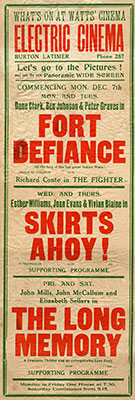 |
|
A Poster from 1952
|
|
(Further research shows that in 1922 the lease was taken over by David Stutley in partnership with A L Jones (both former boot operatives). David Stutley was subsequently declared bankrupt in 1923, to read more click here)
The premises were sold in 1924 to Alfred Watts of Finedon whose son Geoffrey was the last owner until its closure in the early 1960’s. He was married to Phyllis Cook whose father was steward of the Britannia Club and then the Conservative Club in Burton Latimer.
The slogan was “What's on at Watts’ Cinema”. The Watts
family also owned cinemas in Finedon and Irthlingborough and the films would be shown at all cinemas on a rotating schedule. The programme screened in Finedon on Monday and Tuesday evenings would go to Burton for Wednesday and Thursday and to Irthlingborough for Friday and Saturday. Local audiences thus enjoyed a varied programme each week.
A piano stood near the stage and the first pianist was Wilfred, a brother of A.G. Miller and his wife was cashier in the ticket kiosk. Later pianists were Wilf Sturman, Cecil Hickman and Ada Wood. In the early days the directors' wives would also sit in the kiosk and sell tickets.
Some of the caretakers were Ernie and George Potter, Arthur Bray and finally Tom and Blanche Bailey. Mrs. Bailey would sit in the kiosk and then sell ice cream and chocolate during the interval. Tom would shine his torch on noisy children and the local policeman came in every night to see that order was being kept.
When the cinema was first opened the prices of admission were 3d, 6d, 9d, 1/-, 1/3d and half price for children when accompanied by an adult. The seats in the first three rows from the front were wooden forms. The 1/- seats were green leather and the 1/3d red plush.
Originally there were two film shows a week. When Alfred Watts took over it changed to three. Weekday times 7.30 to 10.30 pm. On Saturdays there was an addition of an afternoon matinee. For many years it was a continuous show with no interval. Should the film break down the lights would go on and the children would stamp their feet.
On the night of the first “talkie” which was Al Jolson , extra chairs were brought in and placed in the two aisles. Smoking was allowed in those days. There were serials every week - Trail of the Octapus, Green Arrow, Hurricane Hutch etc. Comedies – McSenwick, Pasque Gazeeter etc. Filmstars of the day – Mary Pickford , Charlie Chaplin , Harold Lloyd , Tom Mix and Buck Jones etc .
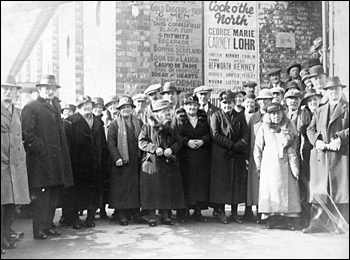 |
|
Old folks cinema treat 1935
|
The cinema could be hired for concerts. Mr. John Wallace Coles and local shoe manufacturer and Jack Benford, hairdresser, would recite and children would be given an orange and bag of sweets. Jack also wrote for the Evening Telegraph as “Simon Straight” under Burton Topics. During the last war long queues would form almost to Duke Street with a quick call into Yeomans' shop for sweets.
| Memories of the Cinema
My “uncle”, Frank Bunyan, was projectionist at the cinema sometime in the 1950s. I would go occasionally with friends – Alan Desborough springs to mind. We would always try to get the centre seats of the front row. The evening was capped with fish and chips on the way home.
Chris Lovell
Do you have your own memories of the old cinema which you could share with us here? Please get in touch.
|
When the cinema closed in the 1960’s Burton Latimer Urban District Council considered acquiring the property and converting into a public hall, but this did not materialise. (Click here to read the valuation). Tommy Dodds of Finedon then opened the building as a Bingo Hall. It became unused for several years then opened again as a cinema for a while, but then closed again through lack of support. (Click here to read about the brief re-opening in 1995) (To read about some odd finds during one of the various conversions, click here). The building has recently been converted into an Italian restaurant.
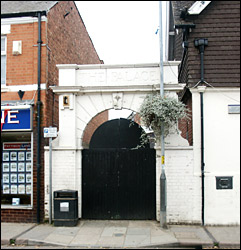 |
|
Cinema entrance arch 2005
|
NB: Arthur Goodman’s son Reginald aged 87, recalls happy memories of the cinema in earlier years.
|
